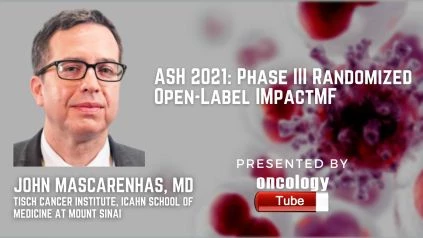John Mascarenhas, MD, Tisch Cancer Institute, Icahn School of Medicine at Mount Sinai speaks about the ASH 2021 Abstract – 1503 A Randomized Open-Label, Phase 3 Study to Evaluate Imetelstat Versus Best Available Therapy (BAT) in Patients with Intermediate-2 (Int-2) or High-Risk Myelofibrosis (MF) Refractory to Janus Kinase Inhibitor (JAKi).
Link to Abstract:
https://ash.confex.com/ash/2021/webprogram/Paper148931.html
Myeloproliferative neoplasm (MF) is a life-threatening myeloproliferative tumor. Only the JAKi inhibitors ruxolitinib and fedratinib have been approved by the FDA as treatments for MF. Despite the benefits reported with ruxolitinib in the frontline setting, a high proportion of patients (pts) discontinue treatment (Abdelrahman 2015), and the median overall survival (OS) is 13-16 months (Kuykendall 2018; Newberry 2017; Schain 2019; Palandri 2019; Mcnamara 2019), indicating a significant unmet need for pts who are non-responsive to a JAKi treatment.
In IMbark, a Phase 2 study in patients with Int-2 or high-risk MF who have relapsed after or are unresponsive to JAKi, imetelstat, a first-in-class telomerase inhibitor, showed significant clinical improvement (Mascarenhas EHA 2020, ASH 2020). At Week 24, imetelstat 9.4 mg/kg treatment resulted in a 32.2 percent symptom response (TSS reduction of 50 percent) and a median OS of 28.1 months, with a total trial follow-up of 42 months. Imetelstat’s dose-dependent suppression of telomerase led in on-target activity that coincided with clinical improvements; a dose-dependent reduction in the frequency of variant alleles of MF driving mutations indicated that the underlying malignant clone was being targeted. The Phase 2 results indicate that imetelstat 9.4 mg/kg should be studied further in a Phase 3 randomized controlled trial.
MYF3001 (IMpactMF; NCT04576156) is a multicenter, open label, randomized (2:1) Phase 3 study of imetelstat against BAT in 320 patients with Int-2 or high-risk MF resistant to JAKi therapy. Patients will be randomly assigned to receive imetelstat 9.4 mg/kg IV every 21 days or BAT, as determined by the investigator (including hydroxyurea, thalidomide, interferon, danazol, hypomethylating agents, chemotherapy, or other non-JAKi containing therapy as appropriate). Platelet count at entry (platelets 75 and 150 x 109/L vs 150 x 109/L) will be used to stratify eligible patients based on a) Int-2 or high-risk according to the Dynamic International Prognostic Scoring System; and b) platelet count at entry (platelets 75 and 150 x 109/L vs 150 x 109/L). Patients who match the criteria for progressing illness and stop using BAT may be eligible to switch to imetelstat.
OS is the primary endpoint, and an interim analysis will be conducted once more than 70% of death events have occurred. Secondary objectives were symptom and spleen response rates at Week 24, progression-free survival, and clinical response assessment using the modified APACHE II scoring system. Myeloproliferative Neoplasms International Working Group, 2013 Time to and length of response, reduction in degree of bone marrow fibrosis, safety, pharmacokinetics, and patient-reported outcomes are among the research and treatment criteria. Imetelstat’s influence on the reduction/depletion of malignant clones will be assessed using biomarkers and mutation studies.
In North and South America, Europe, the Middle East, Australia, and Asia, over 180 sites are planned. Enrollment in the research is now open.

